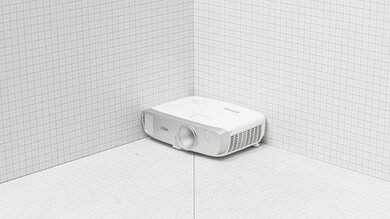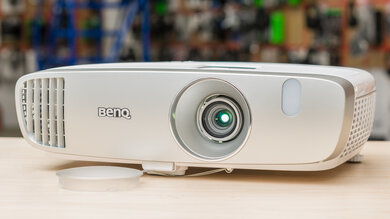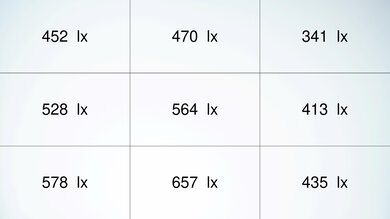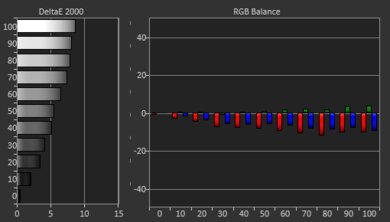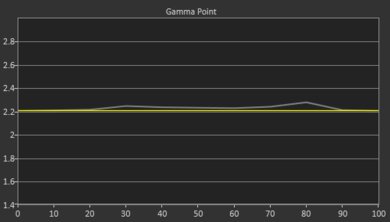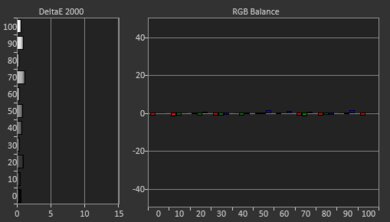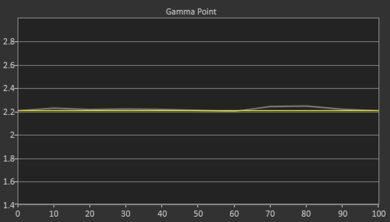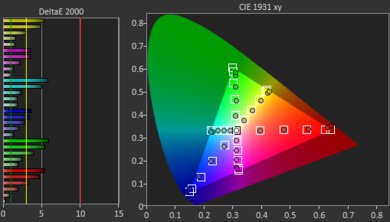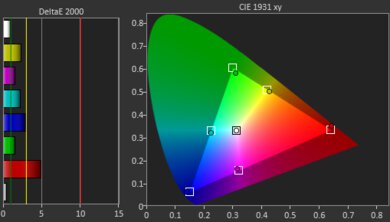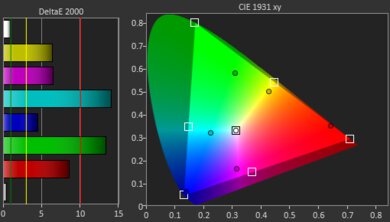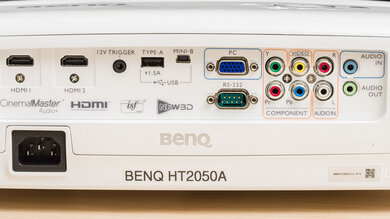The BenQ HT2050A is a 1080p projector primarily aimed at home theater use. It projects a 100" image at a distance of 8.4 to 10.9 feet, 120" at a distance of 10 to 13 feet, and a very large 150" at a distance of 12.5 to 16.3 feet. The projector comes with a vertical lens shift feature and manual 2D keystone adjustments to eliminate trapezoid effects when setting up the projector. It has two HDMI 1.4 ports for 1080 @ 60Hz gaming, with one integrated 10W chambered speaker.
Our Verdict
The BenQ HT2050A is decent for watching movies. Its native contrast is great, so watching movies in pitch-black rooms is a treat. Its brightness is decent enough to handle rooms with a few lights, although the projector is truly at its best in dark rooms. The projector's color gamut is okay, but it just isn't bright enough to really make colors pop. Unfortunately, the projector's color accuracy before calibration is inadequate, so you truly need to calibrate it if you care about color accuracy.
-
Great contrast for deep blacks in dark rooms.
-
Excellent image accuracy after calibration.
-
Inadequate pre-calibration accuracy.
-
Doesn't support HDR.
- 7.2 Movies
Changelog
-
Updated Mar 25, 2025:
We mentioned the newly reviewed BenQ HT2060 in the Pre-Calibration Color Accuracy section of this review.
- Updated Aug 02, 2024: We've converted this review to Test Bench 0.9. We've overhauled our Contrast tests, as we now measure contrast at various average pixel levels (APL). You can see the full changelog here.
- Updated Feb 27, 2024: Mentioned the newly reviewed Epson EX3280 in the Pre-Calibration Color Accuracy section of this review.
- Updated Feb 23, 2024: Mentioned the newly-reviewed BenQ TH671ST in the Pre-calibration Color Accuracy section of this review.
- Updated Feb 16, 2024: Review published.
Check Price
Differences Between Sizes And Variants
We bought and tested the BenQ HT2050A. The BenQ HT2060 has replaced it, and the newer model comes with HDR support, a longer-lasting LED lamp, auto vertical keystone correction, and FILMMAKER mode. The 2050A also has a slightly improved model, the BenQ HT2150ST, which is ISFccc Certified for improved color accuracy out-of-the-box, has auto vertical keystone correction, and has a much shorter throw ratio, allowing it to be placed closer to the wall or screen.
Compared To Other Projectors
The BenQ HT2050A is a decent 1080p projector for watching movies in a dark room due to its great contrast. It's a good choice for the price, as the just barely better BenQ HT3550 is significantly more expensive. Still, the slightly better Epson EpiqVision Flex CO-W01 is even cheaper than the BenQ HT2050A. However, the Epson is better suited for brighter rooms due to its excellent brightness and inadequate contrast, while inversely, the BenQ is better in pitch-black rooms.
See our recommendations for the best projectors for home theater and the best home projectors. If you're looking for something more general, look up our list of the best projectors instead.
The Benq HT2060 is an improvement over the BenQ HT2050A, even if the latter is a bit brighter. Otherwise, the newer HT2060 has deeper contrast, is far more accurate out-of-the-box, has a slightly wider color gamut, and has HDR10 support. It also has a Filmmaker Mode, which respects the content creator's intent quite well. Finally, the HT2060 is also pretty decent for gaming due to its 1080p @ 120Hz support, while the older HT2050A is limited to 1080p @ 60Hz.
The Epson Home Cinema 1080 is better than the BenQ HT2050A. The Epson is significantly brighter, so it's easier to use in rooms with a few lights and has vastly better pre-calibration image accuracy than the BenQ. The BenQ does have better contrast and more extensive calibration options than the Home Cinema 1080, so if you are willing to put in the time to improve the unit's color accuracy, then it can offer superior image quality to the Epson, but out of the box, the Epson model is the better-looking product.
The Epson EX3280 and BenQ HT2050A are different projectors, each with strengths and weaknesses. The Epson EX3280 is a 4:3 projector aimed at office use, so it's very bright and can overcome even well-lit rooms. The BenQ HT2050A is a projector meant for home theater use. It has the better contrast of the two products, as well as a 1080p resolution, which is optimal for content consumption.
The BenQ HT2050A is better than the XGIMI MoGo 2 Pro. The BenQ projects a much brighter image with better contrast, so it looks much better than the XGIMI. While both projectors are inaccurate out-of-the-box, the BenQ is much more accurate than the XGIMI. While you can improve both projectors through calibration, the BenQ has better calibration options, so it looks even better than the XGIMI afterward. The XGIMI is, however, a much smaller product that is significantly easier to carry around and has smart features and wireless connectivity options, which the BenQ lacks.
The BenQ HT2050A offers better image quality than the older BenQ TH671ST. Unfortunately, this comes at a cost, as the HT2050A has inadequate color accuracy out of the box, while the TH671ST excels in that area. If you're willing to calibrate it, then the HT2050A projects a brighter image, with better contrast, than the TH671ST.
The BenQ HT2050A is slightly better than the BenQ HT3550, although the HT3550 is a more recent release with 4k HDR support, while the HT2050A is an older model that's limited to 1080p and lacks HDR. The HT3550 also has a much wider color gamut, although neither projector is bright enough to make colors pop. Still, the older HT2050A has much better contrast and slightly better peak brightness, so it's more capable in a variety of lighting conditions than the sharper HT3550.
The BenQ HT2050A is much better than the KODAK LUMA 350, but they're significantly different projectors. The KODAK is an ultra-lite projector and is meant to be extremely easy to carry around. The BenQ is a bigger projector that is meant for you to install permanently. The BenQ has vastly better image quality. However, the KODAK is small and has more smart features, like an integrated Android TV OS, Wi-Fi, and Bluetooth support, cast capabilities through DLNA, and auto vertical keystone correction.
The Epson EpiqVision Flex CO-W01 and BenQ HT2050A have opposite strengths. The BenQ HT2050A excels in pitch-black rooms due to its great contrast, while inversely, the Epson struggles in dark rooms with its poor contrast and raised blacks. The Epson is, however, much brighter than the BenQ, so it distinguishes itself when the lights are on. The Epson is also more accurate than the BenQ.
The BenQ HT2050A is a bit better than the AWOL Vision LTV-3000 Pro. Still, the AWOL Vision is a UST projector while the BenQ is a more regular long-throw unit, and the latter projects images in 1080p, while the former instead uses pixel shifting to project a higher resolution image. Ultimately, the BenQ has better contrast and is more accurate out-of-the-box, while the AWOL Vision is brighter and has a far wider color gamut.
Test Results
This projector isn't meant to be portable as it's a medium size projector without an integrated battery, so you need to plug it in. The projector lacks auto keystone correction, so you'll need to adjust the image geometry manually, and it also doesn't have autofocus. It doesn't have an adjustable stand, although it has a retractable foot at the front to help adjust the projection angle. You can also adjust the image vertically using the projector's vertical lens shift feature. Finally, it has one 10W chambered speaker.
This DLP projector uses a lamp as its light source, which can last from 3500 to about 7000 hours, according to the manufacturer, after which you'll need to swap the lamp for a new one. As it's a 1080p projector, it's limited to outputting a 1080p @ 60Hz resolution and doesn't have HDR support.
This projector has decent brightness. Its brightness uniformity is okay, with some noticeable color shifting at the edges of the projection. The projector certainly offers an acceptable viewing experience in a dark room. Check out the Epson EpiqVision Flex CO-W01 or Epson EX3280 if you'd prefer something brighter.
The BenQ HT2050A has great native contrast, leading to a very pleasant viewing experience in dark rooms.
The projector has disappointing color accuracy out-of-the-box. Its white balance is very off, with blues and reds being underrepresented in most shades of white, giving them a slight green hue. Its color accuracy is also off, with all colors deviating from what they should be. Thankfully, the projector's color temperature is almost spot-on. If pre-calibration color accuracy is important to you, the BenQ TH671ST and BenQ HT2060 both excel in that area.
This projector has 2-point white balance calibration and full color calibration. After calibration, the projector's color accuracy is excellent; the white balance is now stellar, and the color temperature is still spot-on. Unfortunately, the color accuracy still shows some errors, but it's nowhere near as bad as it was before calibration, as it's now good overall.
The BenQ HT2050A doesn't have a smart OS, but it does have one 10W chambered speaker.
The projector has many legacy ports, like both composite and component inputs, allowing you to connect older video game consoles or media players. It also has a 12v trigger out port to connect your screen to it; this allows you to signal the screen to unfold when the projector powers on and inversely retract the screen when it's powered off. There are two USB ports. Unfortunately, the mini USB port is a service port, and the bigger USB Type-A port is for power delivery only. The projector doesn't support Bluetooth or Wi-Fi.
Comments
BenQ HT2050A: Main Discussion
Let us know why you want us to review the product here, or encourage others to vote for this product.
Update: We mentioned the newly reviewed BenQ HT2060 in the Pre-Calibration Color Accuracy section of this review.


